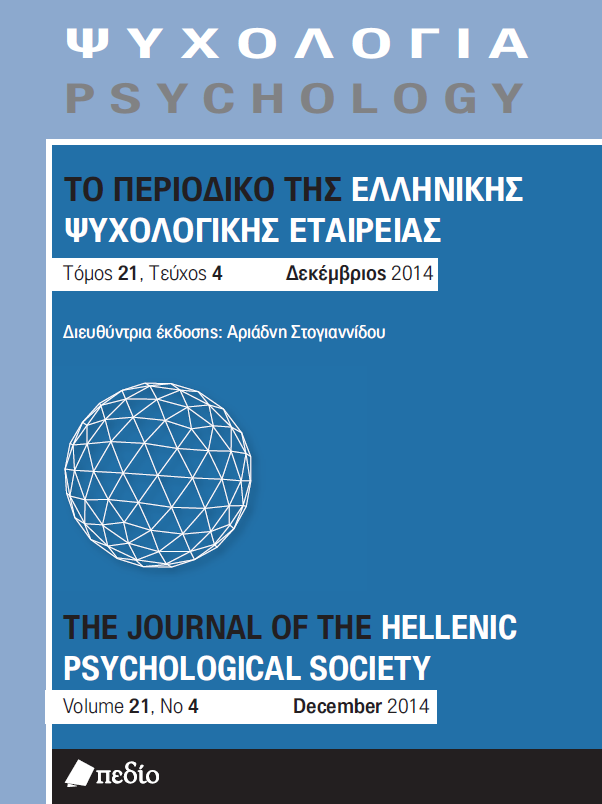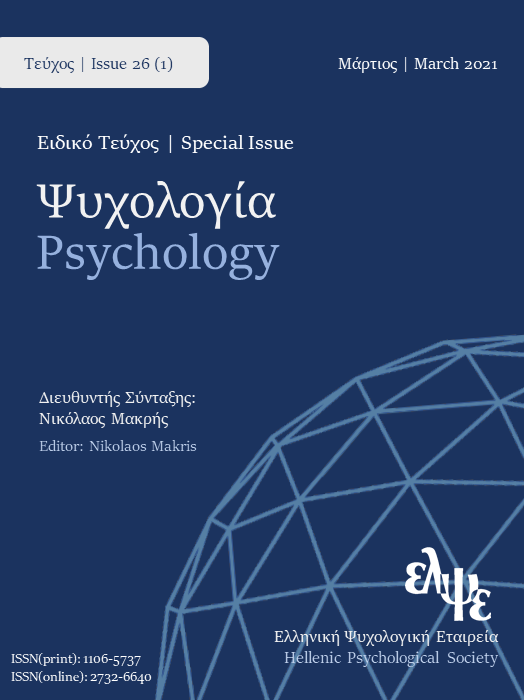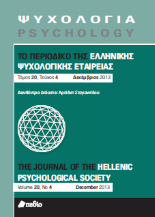Nοητική ανεπάρκεια και στρες των μητέρων: Το παράδειγμα της Ελλάδας

Περίληψη
Έρευνες έχουν δείξει ότι οι γονείς παιδιών με νοητική ανεπάρκεια διακρίνονται από υψηλότερα επίπεδα άγχους σε σχέση με γονείς παιδιών τυπικής ανάπτυξης. Tρεις κύριες περιοχές πηγής γονεϊκού άγχους περιλαμβάνουν τη συννοσηρότητα της κατάστασης του παιδιού, τα γονεϊκά χαρακτηριστικά και τις καταστάσεις ζωής των γονέων. Ο σκοπός της παρούσας μελέτης ήταν η διερεύνηση των αντιλήψεων ελληνίδων μητέρων για τα χαρακτηριστικά των παιδιών τους με νοητική ανεπάρκεια και των συνθηκών της ζωής τους ως στρεσογόνους παράγοντες. η έρευνα διεξήχθη στη ρόδο. στην έρευνα συμμετείχαν πενήντα εννέα μητέρες με παιδιά που είχαν διαγνωσθεί με μέτρια νοητική ανεπάρκεια με και χωρίς συννοσηρότητα. Για τη συλλογή των δεδομένων χρησιμοποιήθηκαν συνεντεύξεις. Κύρια ευρήματα της έρευνας ήταν ότι το στρες ποικίλλει μεταξύ των μητέρων των παιδιών με νοητική ανεπάρκεια και ότι η συννοσηρότητα των παιδιών με νοητική ανεπάρκεια φαίνεται να είναι ο πιο σημαντικός στρεσογόνος παράγοντας για τις μητέρες. η υποστήριξη της οικογένειας θα πρέπει να βασίζεται στο μοντέλο εταιρικής σχέσης-ενδυνάμωσης. περαιτέρω έρευνα σχετικά με τις ανάγκες της οικογένειας των παιδιών με νοητική ανεπάρκεια είναι απαραίτητη στην ελλάδα, έτσι ώστε τα παιδιά να έχουν υποστήριξη σε όλη τη διάρκεια της ζωής τους.
Λεπτομέρειες άρθρου
- Πώς να δημιουργήσετε Αναφορές
-
Βουγιούκας Κ., Τζουριάδου Μ., Μενεξές Γ., Γκέκα Μ., & Μιχαλοπούλου Λ. .-. Ε. (2017). Nοητική ανεπάρκεια και στρες των μητέρων: Το παράδειγμα της Ελλάδας. Ψυχολογία: το περιοδικό της Ελληνικής Ψυχολογικής Εταιρείας, 21(4), 421–436. https://doi.org/10.12681/psy_hps.23510
- Τεύχος
- Τόμ. 21 Αρ. 4 (2014)
- Ενότητα
- ΕΜΠΕΙΡΙΚΕΣ ΕΡΓΑΣΙΕΣ

Αυτή η εργασία είναι αδειοδοτημένη υπό το Creative Commons Attribution-ShareAlike 4.0 International License.
Το περιοδικό ΨΥΧΟΛΟΓΙΑ έχει υιοθετήσει μία πολιτική Platinum open-access. Τα έξοδα υποβολής, επεξεργασίας ή δημοσίευσης των εργασιών καλύπτονται από την Ελληνική Ψυχολογική Εταιρεία. Τα πνευματικά δικαιώματα των δημοσιευμένων εργασιών προστατεύονται από την άδεια 'Creative Commons Attribution-ShareAlike 4.0 International'. Οι Συγγραφείς διατηρούν τα Πνευματικά Δικαιώματα και χορηγούν στο περιοδικό το δικαίωμα της πρώτης δημοσίευσης. Η άδεια αυτή επιτρέπει σε τρίτους, να χρησιμοποιούν την εργασία σε οποιαδήποτε μορφή, με την προϋπόθεση της διατήρησης των διατυπώσεων που προβλέπονται στην άδεια σχετικά με την αναφορά στον αρχικό δημιουργό και την αρχική δημοσίευση στο περιοδικό ΨΥΧΟΛΟΓΙΑ. Επιπλέον, κάθε διανομή της εργασίας οφείλει να γίνεται με τους ίδιους όρους διανομής, δηλαδή με την ίδια άδεια Creative Commons.




